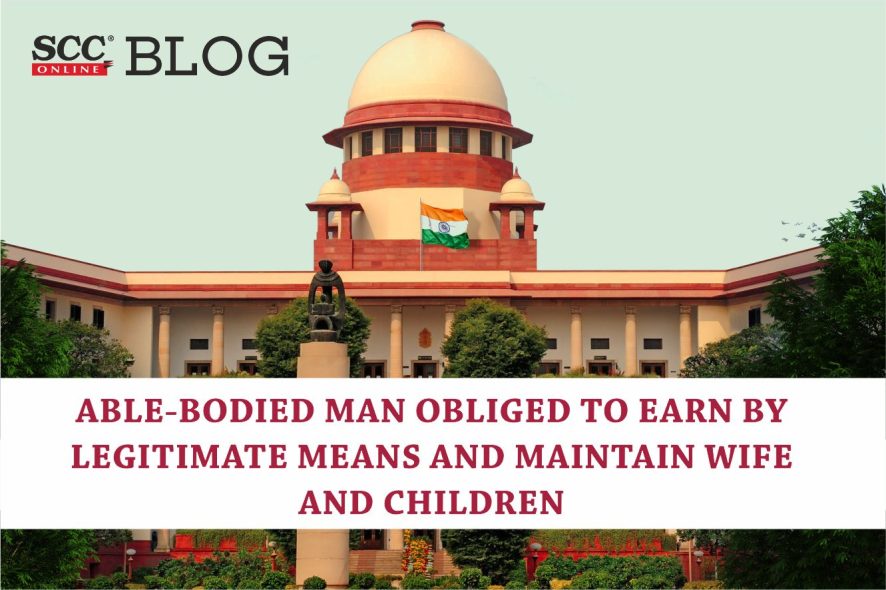Supreme Court: In an appeal directed against the judgment passed by the Punjab and Haryana High Court, confirming the Family Court’s order dismissing the maintenance petition of the appellant and her daughter, the division bench of Bela M. Trivedi*. and Dinesh Maheshwari, JJ has held that it is unfortunate that such an erroneous and perverse order of Family Court, was confirmed by the High Court in a very perfunctory impugned order, without assigning any reasons. . Thus, the Court directed the respondent to pay maintenance amount of Rs. 10,000/- per month to the appellant\wife from the date of filing of her Maintenance Petition before the Family Court, over and above the maintenance allowance of Rs. 6,000/- granted by the Family Court to the appellant/son.
In this case the appellants filed the Maintenance Petition under Section 125 of Code of Criminal Procedure (CrPC) seeking maintenance from the respondent alleging that the respondent was subjecting the appellant/wife to utmost cruelty and physical and mental torture, thus she had to leave her matrimonial home along with children time and again. The Family Court vide the order dated 15.07.2014 had granted Interim Maintenance allowance of Rs. 40,000/- per month in favour of the appellants, however, the daughter having attained majority, no interim maintenance was granted to her. The respondent had challenged all the three orders passed by the Family Court, by filing revision applications before the High Court, however, in none of the said proceedings, the High Court had granted any stay of the proceedings of the Family Court. The Family Court, after appreciating the evidence, passed the order rejecting the application of appellant and her daughter, and granting maintenance allowance of Rs. 6,000/- per month to the son. Further, being aggrieved by the same, the appellants had preferred the revision application before the High Court, which had been dismissed vide the impugned order.
The Court observed that on the request of the parties it had referred the matter to the Supreme Court Mediation Centre for exploring the possibility of settlement, however, the same having failed, the Court had passed an order on 17.08.2022 in Anju Garg v. Deepak Kumar Garg, 2022 SCC OnLine SC 1363
The Court cited Bhuwan Mohan Singh v. Meena, (2015) 6 SCC 353, wherein it was held that “proceedings under Section 125 CrPC are of a summary nature and are intended to enable destitute wives and children, the latter whether they are legitimate or illegitimate, to get maintenance in a speedy manner”, and observed that Section 125 of CrPC was conceived to ameliorate the agony, anguish and financial suffering of a woman who is required to leave the matrimonial home, so that some suitable arrangements could be made to enable her to sustain herself and the children. It was also observed that the Family Court had disregarded the basic canon of law that it is the sacrosanct duty of the husband to provide financial support to the wife and to the minor children and the husband is required to earn money even by physical labour, if he is able-bodied, and could not avoid his obligation, except on the legally permissible grounds mentioned in the statute.
The Court referred to the ruling in Chaturbhuj v. Sita Bai, (2008) 2 SCC 316, wherein it was held that “the object of maintenance proceedings is not to punish a person for his past neglect, but to prevent vagrancy and destitution of a deserted wife, by providing her food, clothing, and shelter by a speedy remedy. Further, Section 125 Cr.P.C is a measure of social justice and is specially enacted to protect women and children. It also falls within the Constitutional sweep of Article 15(3), reinforced by Article 39 of the Constitution of India.
The Court held that the Family Court had not only overlooked and disregarded the aforesaid settled legal position but had proceeded with the proceedings in absolutely pervert manner. Further, the right of the respondent to cross-examine the witnesses of the appellant was closed, as he had failed to appear before the Family Court despite the issuance of warrants, clearly established that he had no regards for his own family nor had any regards for the Court or for the law.
The Court further viewed that the allegations made by the appellant/wife in her evidence before the Court had remained unchallenged and, therefore, there was no reason for the Family Court to disbelieve her version, and to believe the oral submissions made by the respondent which had no basis. Further, in absence of any evidence on record adduced by the respondent disputing the evidence adduced by the appellant, the Family Court could not have passed the order believing the oral submissions of the respondent. It was also observed that the appellant had clearly stated as to how she was harassed and subjected to cruelty by the respondent, which had constrained her to leave the matrimonial home along with her children, and as to how the respondent had failed and neglected to maintain her and her children.
Moreover, it was viewed that even if the allegations of dowry demand by the respondent were not believed, there was enough evidence to believe that money was being paid to the respondent by the father of the appellant/wife, which substantiated her allegation that the respondent was demanding money from her father and was subjecting her to harassment.
Thus, the Court directed the respondent to pay maintenance amount of Rs. 10,000/- per month to the appellant\wife from the date of filing of her Maintenance Petition before the Family Court.
[Anju Garg v. Deepak Kumar Garg, 2022 SCC OnLine SC 1314, decided on 28.09.2022]
*Judgment by: Justice Bela M. Trivedi.






